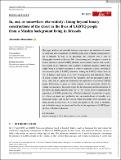Files in this item
In, out, or somewhere else entirely : going beyond binary constructions of the closet in the lives of LGBTQ people from a Muslim background living in Brussels
Item metadata
| dc.contributor.author | Boussalem, Alessandro | |
| dc.date.accessioned | 2023-02-10T11:30:16Z | |
| dc.date.available | 2023-02-10T11:30:16Z | |
| dc.date.issued | 2021-06-01 | |
| dc.identifier | 283291981 | |
| dc.identifier | fbd4fae5-1f15-4e7d-8e93-89989a2f1baa | |
| dc.identifier | 000599083700001 | |
| dc.identifier | 85097593430 | |
| dc.identifier.citation | Boussalem , A 2021 , ' In, out, or somewhere else entirely : going beyond binary constructions of the closet in the lives of LGBTQ people from a Muslim background living in Brussels ' , Transactions of the Institute of British Geographers , vol. 46 , no. 2 , pp. 435-448 . https://doi.org/10.1111/tran.12422 | en |
| dc.identifier.issn | 0020-2754 | |
| dc.identifier.other | ORCID: /0000-0003-1367-5499/work/128568235 | |
| dc.identifier.uri | https://hdl.handle.net/10023/26949 | |
| dc.description | Funding: This work was supported by Economic and Social Research Council. | en |
| dc.description.abstract | This paper analyses and critically discusses experiences and narratives of sexuality disclosure and concealment of LGBTQ people from a Muslim background living in Brussels. It does so by presenting data collected over a year of ethnographic research in the city. The "closet/coming out" metaphor is central in western discourses around LGBTQ identities and sexualities, and its wide circulation resulted in its conflations with a number of different meanings. Rather than simply being a descriptive metaphor, it comes to represent a linear, tautological, and normative path of LGBTQ liberation, leading the LGBTQ subject from an "in" of darkness and secrecy to an "out" of transparency and authenticity. Queer of colour scholars have noted how the metaphor, and the prescriptive path it traces, often fails to capture and understand the experiences of racialised LGBTQ people. Elaborating on queer of colour critiques to the normativity charted by coming out discourses, this paper argues for the unpacking and deconstruction of the binary and linear trajectory from "in" to "out" of the closet to understand the experiences of LGBTQ people from a Muslim background. In particular, it argues for a focus on silence as a productive site, on non-disclosure of sexuality as a functional strategy, and on the ways in which knowledge about sexualities can often circulate in tacit ways. As a result, the rigidity of the closet is disrupted, and its borders emerge as porous and flexible in the experiences of LGBTQ people from a Muslim background. | |
| dc.format.extent | 14 | |
| dc.format.extent | 236496 | |
| dc.language.iso | eng | |
| dc.relation.ispartof | Transactions of the Institute of British Geographers | en |
| dc.subject | Brussels | en |
| dc.subject | Ethnography | en |
| dc.subject | LGBTQ | en |
| dc.subject | Muslim | en |
| dc.subject | Queer of colour | en |
| dc.subject | Sexualities | en |
| dc.subject | GF Human ecology. Anthropogeography | en |
| dc.subject | GN Anthropology | en |
| dc.subject | NDAS | en |
| dc.subject | MCC | en |
| dc.subject.lcc | GF | en |
| dc.subject.lcc | GN | en |
| dc.title | In, out, or somewhere else entirely : going beyond binary constructions of the closet in the lives of LGBTQ people from a Muslim background living in Brussels | en |
| dc.type | Journal article | en |
| dc.contributor.institution | University of St Andrews. School of Geography & Sustainable Development | en |
| dc.identifier.doi | https://doi.org/10.1111/tran.12422 | |
| dc.description.status | Peer reviewed | en |
This item appears in the following Collection(s)
Items in the St Andrews Research Repository are protected by copyright, with all rights reserved, unless otherwise indicated.

